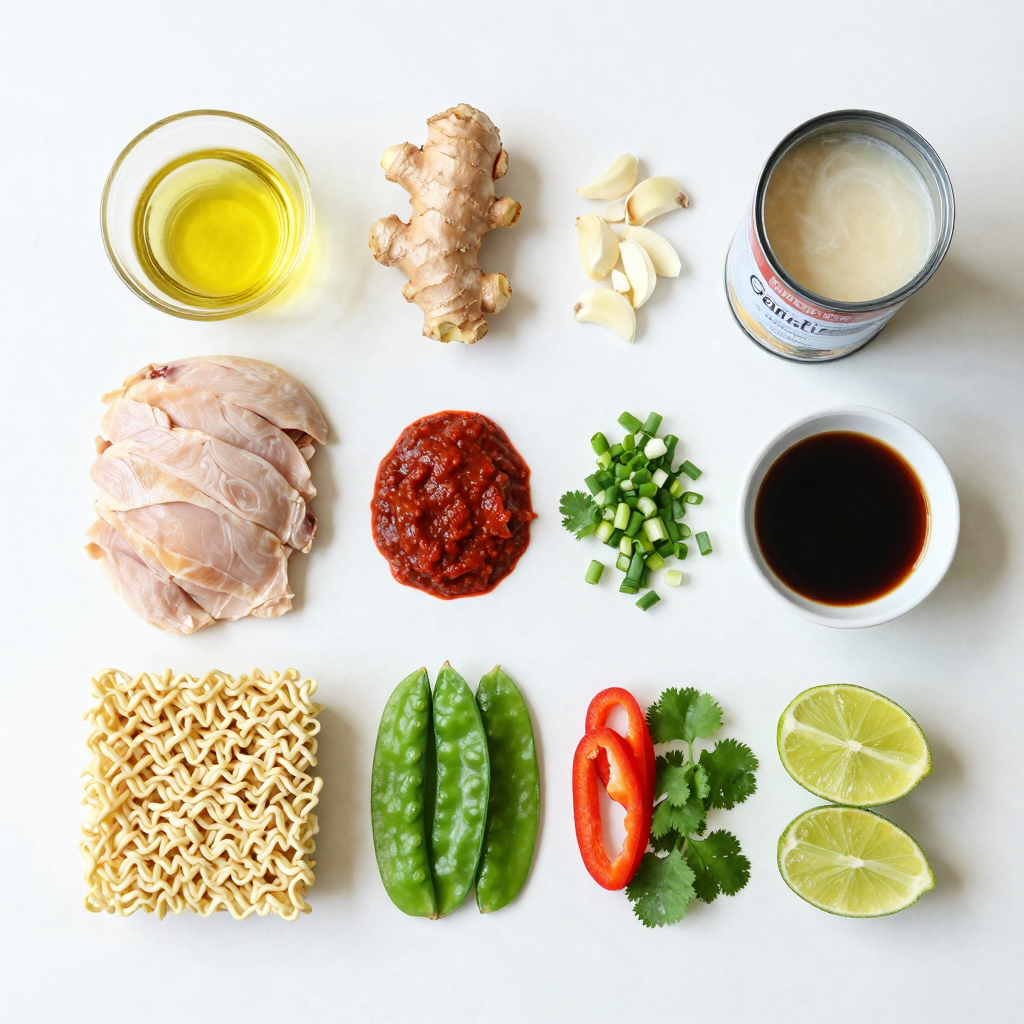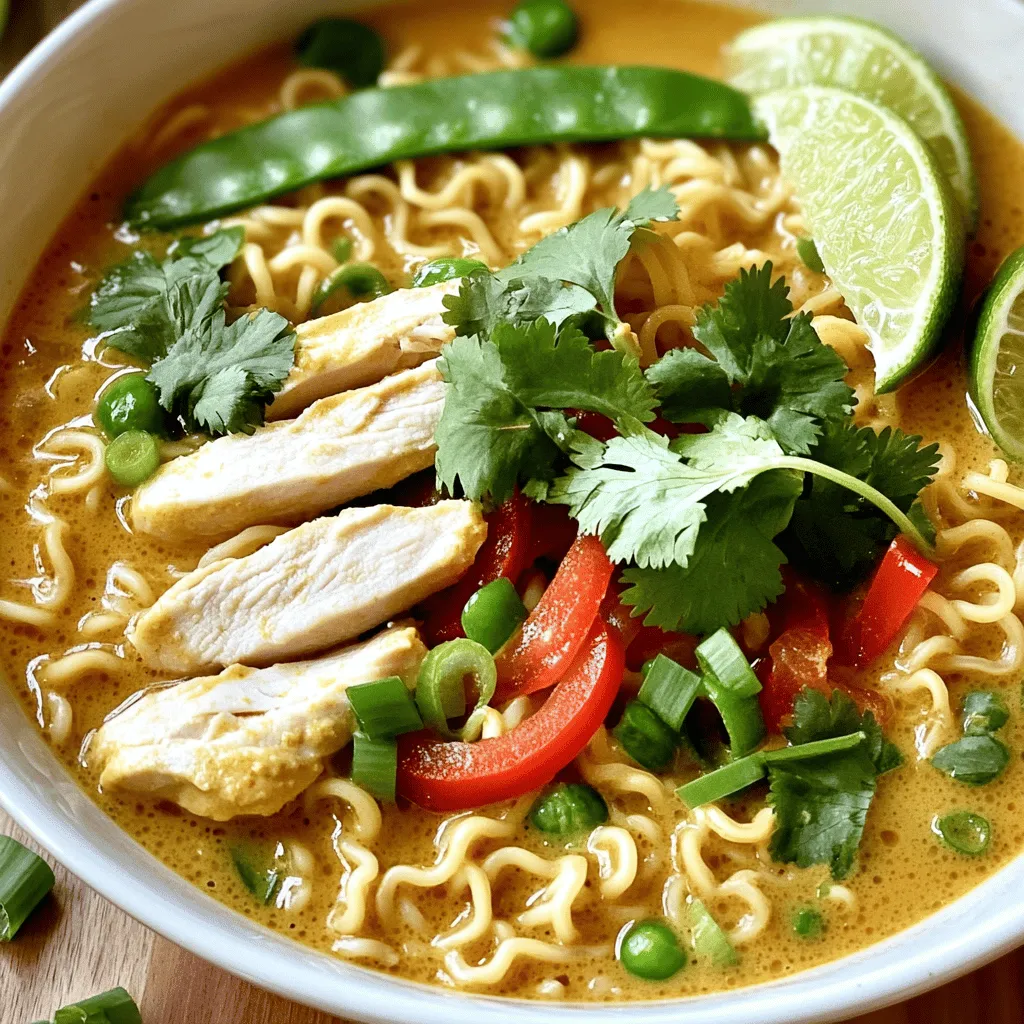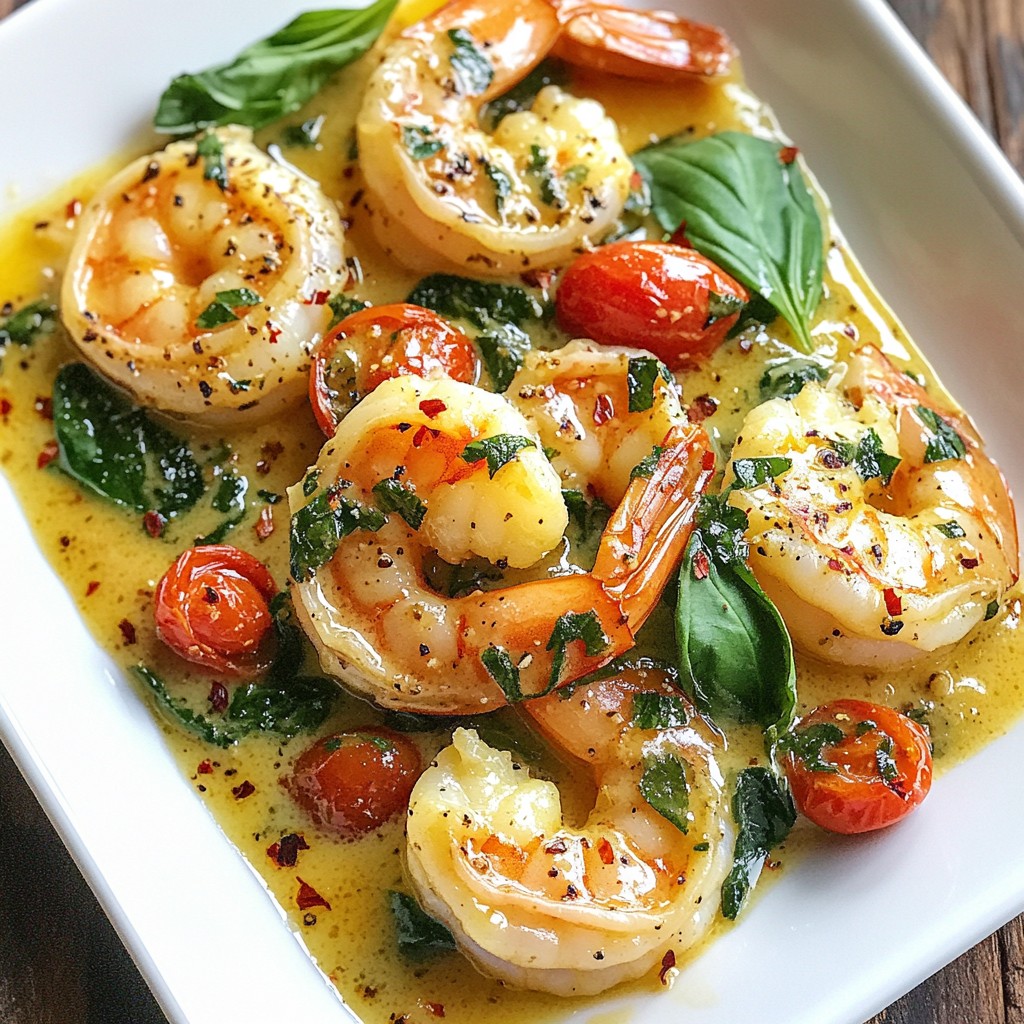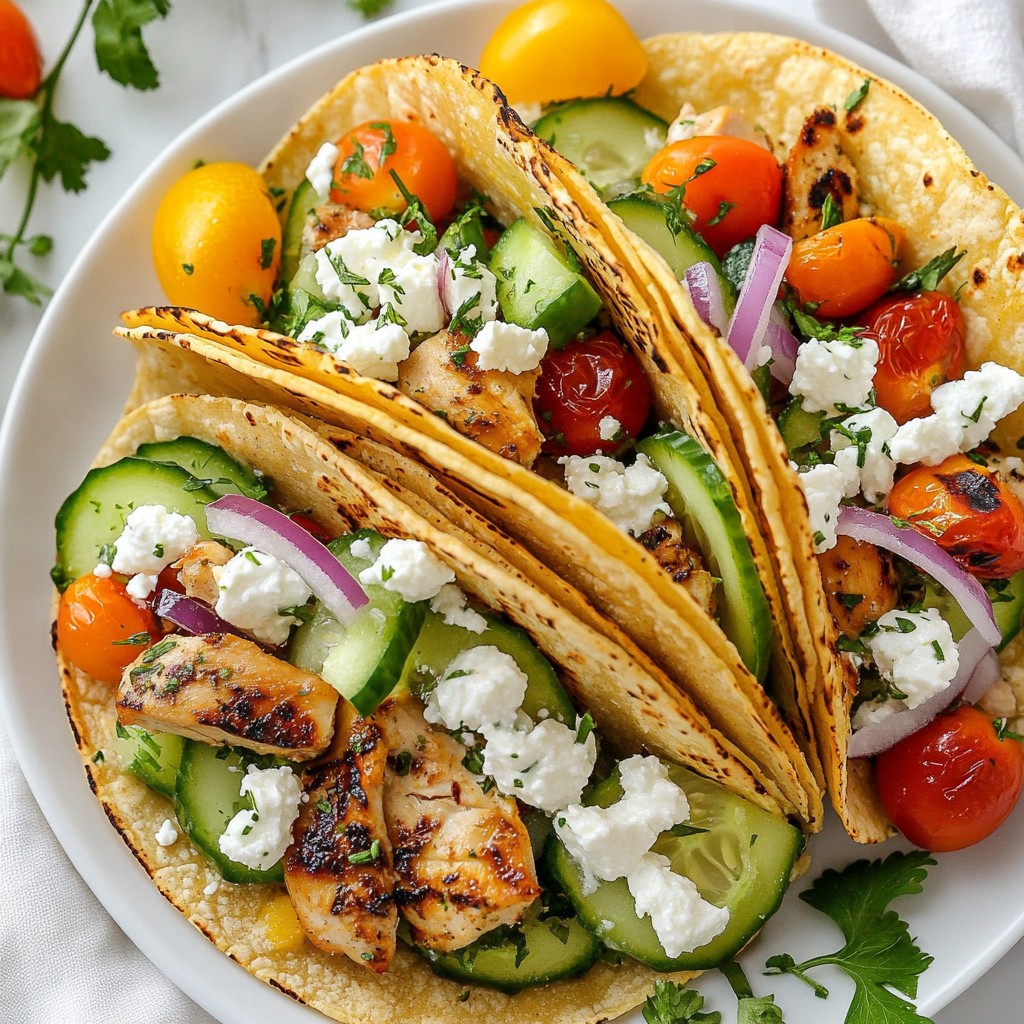Welcome to a world of flavor! In this Coconut Curry Chicken Ramen, you blend rich coconut milk with tender chicken and savory ramen noodles. This dish brings warmth and comfort with every bite. I’ll walk you through simple steps to create a delicious dinner delight. Get ready to impress your taste buds and your dinner guests with this quick, vibrant meal. Let’s dive in!
Why I Love This Recipe
- Delicious Flavor Fusion: The combination of coconut milk and red curry paste creates a rich, creamy broth that is both comforting and exciting.
- Quick and Easy: This recipe is ready in just 30 minutes, making it perfect for a weeknight dinner when you’re short on time.
- Healthy Ingredients: Packed with lean chicken, fresh vegetables, and aromatic spices, this dish is a nutritious choice for any meal.
- Customizable: You can easily adjust the spice level or add your favorite vegetables to make this ramen your own.
Ingredients
Main Components
– 2 boneless, skinless chicken breasts, thinly sliced
– 1 can (13.5 oz) coconut milk
– 200g ramen noodles
Chicken is the star here. I use boneless, skinless chicken breasts for a tender bite. Slice them thin for quick cooking. Coconut milk adds creaminess and a rich flavor. It brings warmth to the dish. Ramen noodles provide a delightful chew. They soak up the broth perfectly.
Aromatics and Seasonings
– 1 tablespoon coconut oil
– 1 tablespoon fresh ginger, grated
– 3 cloves garlic, minced
– 2 tablespoons red curry paste
Coconut oil adds a subtle sweetness. It helps the aromatics bloom. Fresh ginger gives a zingy kick. Garlic adds depth to the dish. Red curry paste is the heart of flavor. It adds heat and spice, transforming the broth.
Vegetables and Garnishes
– 1 cup snow peas
– 1 red bell pepper, thinly sliced
– 2 green onions, chopped (for garnish)
– Fresh cilantro (for garnish)
– Lime wedges (for serving)
Snow peas add crunch and color. They cook quickly, keeping their bright look. Red bell pepper brings sweetness and a pop of color. For garnishes, green onions and fresh cilantro add freshness. Lime wedges give a tangy finish. Just a squeeze brightens every bite.

Step-by-Step Instructions
Preparation Steps
– Preparing the ingredients: Gather all your ingredients first. This makes cooking easier. Slice the chicken breasts into thin pieces. Grate the fresh ginger and mince the garlic. Thinly slice the red bell pepper and chop the green onions. This prep helps the dish cook fast and keeps flavors bright.
– Cooking the chicken: Heat one tablespoon of coconut oil in a large pot over medium heat. Add the ginger and garlic, cooking for about one minute. The smell will be great! Next, add the sliced chicken and cook until it’s no longer pink, about five to seven minutes. This step ensures the chicken is juicy and tender.
Saucing the Dish
– Incorporating the curry paste and liquids: Stir in two tablespoons of red curry paste. Cook this for two more minutes. This deepens the flavor. Then, pour in one can of coconut milk and four cups of chicken broth. Stir well and bring it all to a gentle simmer.
– Simmering the broth: Add two tablespoons of soy sauce and one tablespoon of lime juice. Mix everything together. Let it simmer for about ten minutes. This allows the flavors to blend together nicely.
Final Cooking Steps
– Cooking the noodles: Add 200 grams of ramen noodles to the pot. Cook them according to the package instructions, usually about three to four minutes. Stir occasionally to keep them from sticking.
– Adding vegetables and garnishing: In the last minute of cooking, toss in one cup of snow peas and the sliced red bell pepper. Cook just until they are tender but still bright. Remove the pot from heat. Serve the ramen in bowls and garnish with chopped green onions and fresh cilantro. Lime wedges on the side add a nice extra zing!
Pro Tips
- Use Fresh Ingredients: Fresh ginger and garlic will enhance the flavor of your curry significantly compared to dried alternatives.
- Adjust Spice Level: Feel free to add more or less red curry paste depending on your spice preference. Start with a smaller amount, then taste and adjust.
- Perfect Noodle Texture: Be careful not to overcook the ramen noodles; they should be al dente to maintain a nice bite in the soup.
- Garnish for Flavor: Adding fresh cilantro and lime juice just before serving brightens the dish and enhances the overall flavor profile.
Tips & Tricks
Perfecting the Flavor
To make your coconut curry chicken ramen shine, adjust the seasoning. Taste as you go. If it needs more heat, add a pinch of chili flakes. For a sweeter touch, a dash of sugar works wonders. Fresh herbs elevate this dish. Use cilantro or green onions for a bright finish. They add freshness and a pop of color.
Cooking with Ramen
Choosing the right ramen noodles is key. Look for fresh or dried noodles at your local store. Fresh noodles cook quickly and give a nice chew. If you use dried, follow the package instructions. Cooking time is important. Always add the noodles at the right moment. This way, they won’t turn mushy.
Serving Suggestions
Pair your ramen with a light salad or spring rolls. A crisp side contrasts nicely with the rich soup. For drinks, iced tea or coconut water complements the meal. When serving, present the ramen in deep bowls. Garnish with green onions and cilantro. Add lime wedges for a zesty touch. This makes the dish look appealing and tasty!
Variations
Protein Alternatives
You can switch the chicken for shrimp or tofu. Shrimp cooks quickly and adds a nice texture. Tofu, when firm, absorbs flavors well and adds protein. If you want to use different meats, consider pork or beef. Just ensure the meat is thinly sliced to cook evenly.
Flavor Additions
Adding more vegetables makes the dish even better. Try carrots, spinach, or mushrooms for extra flavor and nutrition. You can also experiment with spices. Adding a dash of cumin or coriander gives a nice twist. Feel free to adjust the heat by adding chili flakes or fresh peppers.
Dietary Adjustments
To make this dish gluten-free, use rice noodles instead of ramen. Check your soy sauce; choose a gluten-free brand. For a vegetarian version, simply skip the chicken and add more veggies or tofu. You can still use the same base of broth and coconut milk for rich flavor.
Storage Info
Refrigeration Tips
To store your leftover Coconut Curry Chicken Ramen, let it cool first. Place it in an airtight container. This helps keep the flavors fresh. You can keep it in the fridge for up to three days. If you wait longer, the noodles might get too soft, and the taste may change.
Freezing Instructions
Freezing is a great option for longer storage. First, cool your ramen completely. Then, portion it into freezer-safe bags or containers. Try to remove as much air as possible. This prevents freezer burn. You can freeze it for up to three months. When you’re ready to eat, just thaw it in the fridge overnight.
Reheating Methods
When reheating, you can use either the stovetop or the microwave. The stovetop will give you better results, keeping the texture. Pour your ramen into a pot and add a splash of broth. Heat it gently over low heat, stirring often. This way, the noodles stay firm. If using the microwave, place your ramen in a safe bowl. Add a little broth, cover it, and heat in short bursts, stirring in between. This helps maintain the flavor, too.
FAQs
Common Questions
Can I use a different type of curry paste?
Yes, you can use green or yellow curry paste. Each has a unique flavor. Green curry is spicier, while yellow is milder. Adjust the amount based on your taste.
What can I substitute for coconut milk?
If you need a substitute, use almond milk or soy milk. These options change the flavor a bit. Add some coconut extract to mimic the taste.
Serving Questions
Can I make this dish in advance?
You can make this dish ahead of time. Just store the soup and noodles separately. This keeps the noodles from getting soggy. Reheat when ready to serve.
What are good side dishes to serve with it?
Serve this ramen with a fresh salad or steamed rice. You can also pair it with spring rolls for extra crunch.
Cooking Technique Questions
How do I prevent the noodles from getting too soggy?
Cook the noodles just before serving. Drain them and rinse with cold water. This stops the cooking process and keeps them firm.
What are the signs that the chicken is fully cooked?
The chicken should be white all the way through. Use a meat thermometer to check for 165°F. This ensures it is safe to eat.
This blog post covered a delicious ramen dish with chicken, coconut milk, and fresh veggies. We explored key ingredients, from ginger to red curry paste, and stepped through easy cooking steps. I shared tips for flavor, serving ideas, and how to store your dish. Remember, you can customize this recipe in many ways. Try different proteins or make it vegetarian. Use fresh herbs to boost flavor. With these ideas, you can create a tasty meal every time. Enjoy cooking and sharing this dish with others.




